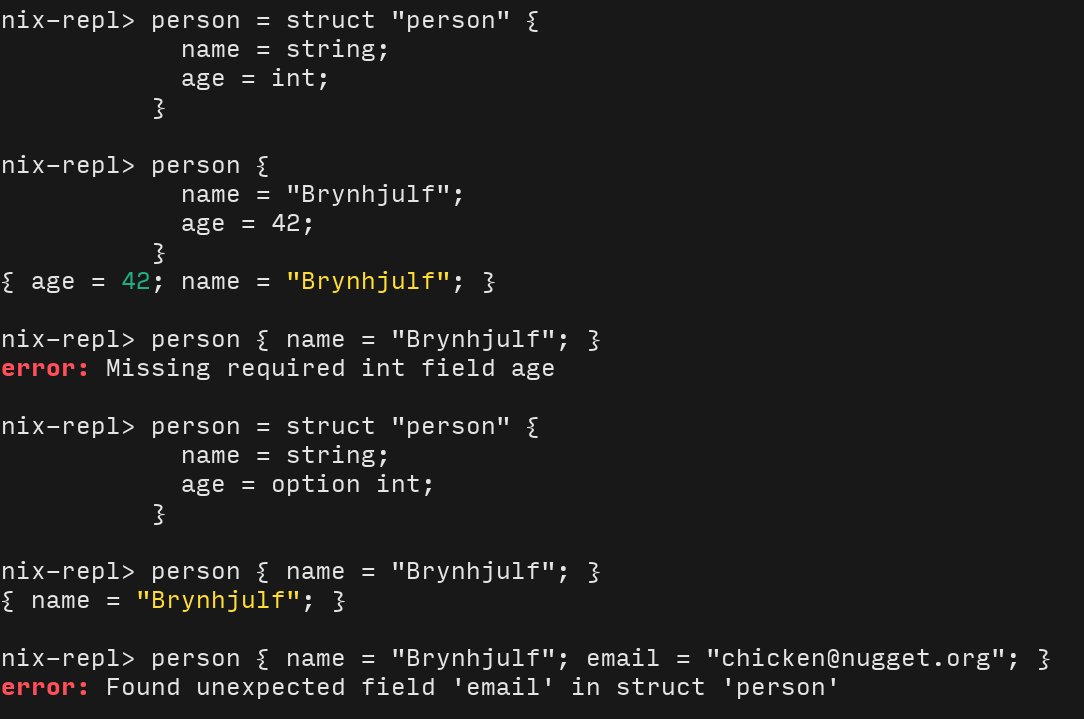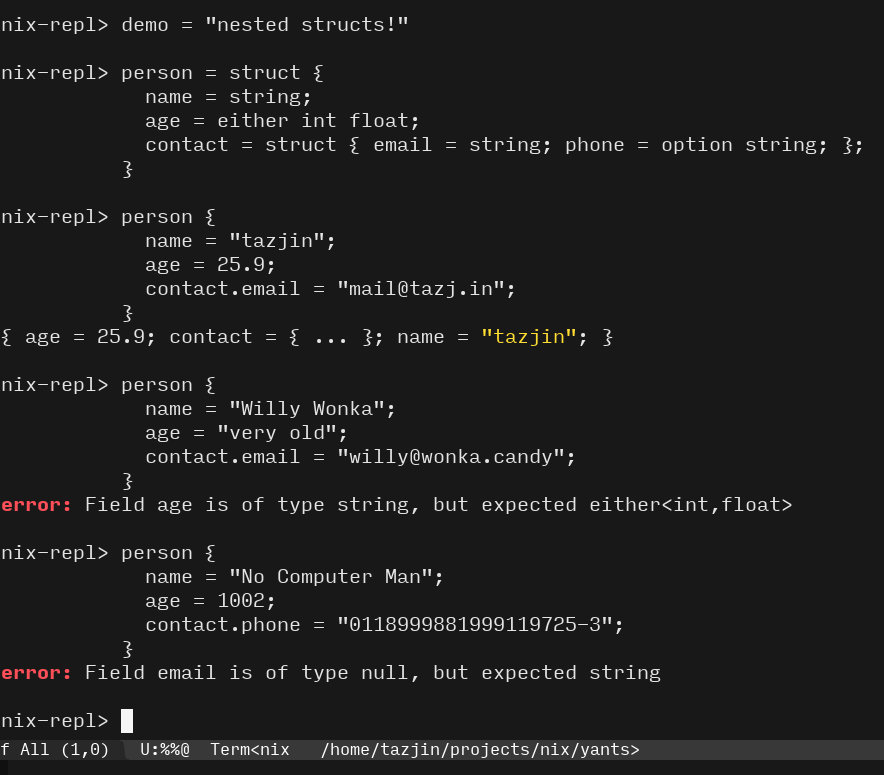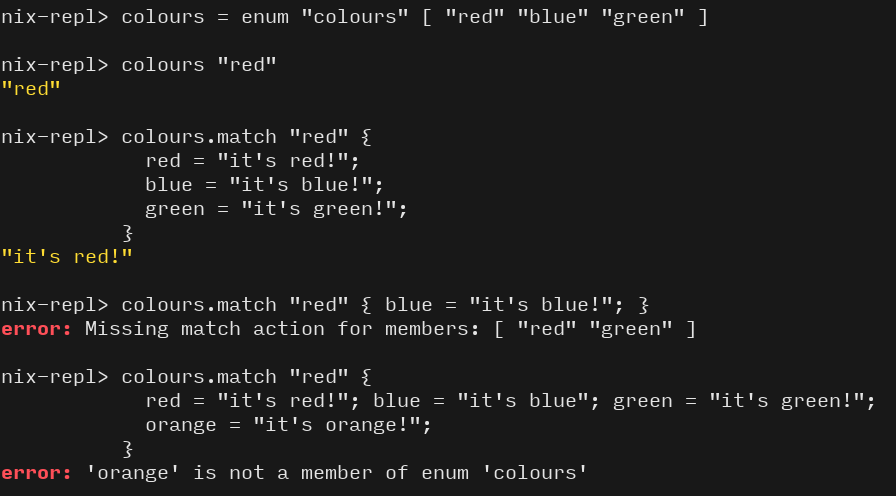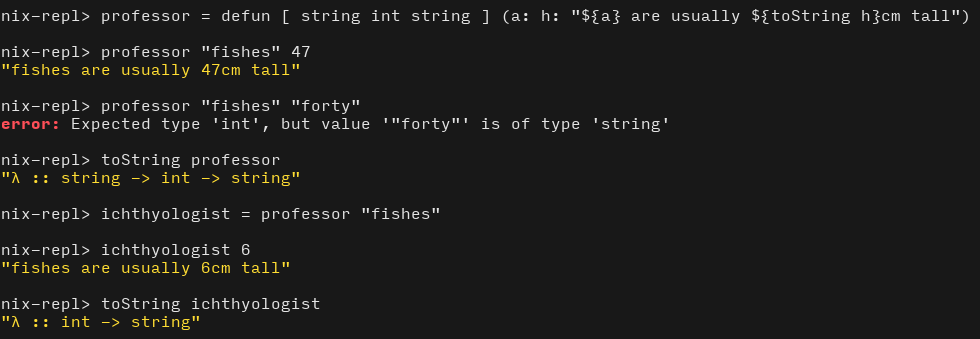diff options
Diffstat (limited to 'nix/yants')
| -rw-r--r-- | nix/yants/README.md | 88 | ||||
| -rw-r--r-- | nix/yants/default.nix | 298 | ||||
| -rw-r--r-- | nix/yants/screenshots/enums.png | bin | 0 -> 41305 bytes | |||
| -rw-r--r-- | nix/yants/screenshots/functions.png | bin | 0 -> 32907 bytes | |||
| -rw-r--r-- | nix/yants/screenshots/nested-structs.png | bin | 0 -> 70264 bytes | |||
| -rw-r--r-- | nix/yants/screenshots/simple.png | bin | 0 -> 43010 bytes | |||
| -rw-r--r-- | nix/yants/screenshots/structs.png | bin | 0 -> 69499 bytes | |||
| -rw-r--r-- | nix/yants/tests/default.nix | 94 |
8 files changed, 480 insertions, 0 deletions
diff --git a/nix/yants/README.md b/nix/yants/README.md new file mode 100644 index 000000000000..d17ea61b52d1 --- /dev/null +++ b/nix/yants/README.md @@ -0,0 +1,88 @@ +yants +===== + +This is a tiny type-checker for data in Nix, written in Nix. + +# Features + +* Checking of primitive types (`int`, `string` etc.) +* Checking polymorphic types (`option`, `list`, `either`) +* Defining & checking struct/record types +* Defining & matching enum types +* Defining & matching sum types +* Defining function signatures (including curried functions) +* Types are composable! `option string`! `list (either int (option float))`! +* Type errors also compose! + +Currently lacking: + +* Any kind of inference +* Convenient syntax for attribute-set function signatures + +## Primitives & simple polymorphism + + + +## Structs + + + +## Nested structs! + + + +## Enums! + + + +## Functions! + + + +# Usage + +Yants can be imported from its `default.nix`. A single attribute (`lib`) can be +passed, which will otherwise be imported from `<nixpkgs>`. + +TIP: You do not need to clone my whole repository to use Yants! It is split out +into the `nix/yants` branch which you can clone with, for example, `git clone -b +nix/yants https://git.tazj.in yants`. + +Examples for the most common import methods would be: + +1. Import into scope with `with`: + ```nix + with (import ./default.nix {}); + # ... Nix code that uses yants ... + ``` + +2. Import as a named variable: + ```nix + let yants = import ./default.nix {}; + in yants.string "foo" # or other uses ... + ```` + +3. Overlay into `pkgs.lib`: + ```nix + # wherever you import your package set (e.g. from <nixpkgs>): + import <nixpkgs> { + overlays = [ + (self: super: { + lib = super.lib // { yants = import ./default.nix { inherit (super) lib; }; }; + }) + ]; + } + + # yants now lives at lib.yants, besides the other library functions! + ``` + +Please see my [Nix one-pager](https://github.com/tazjin/nix-1p) for more generic +information about the Nix language and what the above constructs mean. + +# Stability + +The current API of Yants is **not yet** considered stable, but it works fine and +should continue to do so even if used at an older version. + +Yants' tests use Nix versions above 2.2 - compatibility with older versions is +not guaranteed. diff --git a/nix/yants/default.nix b/nix/yants/default.nix new file mode 100644 index 000000000000..aacc156b433b --- /dev/null +++ b/nix/yants/default.nix @@ -0,0 +1,298 @@ +# Copyright 2019 Google LLC +# SPDX-License-Identifier: Apache-2.0 +# +# Provides a "type-system" for Nix that provides various primitive & +# polymorphic types as well as the ability to define & check records. +# +# All types (should) compose as expected. + +{ lib ? (import <nixpkgs> {}).lib, ... }: + +with builtins; let + prettyPrint = lib.generators.toPretty {}; + + # typedef' :: struct { + # name = string; + # checkType = function; (a -> result) + # checkToBool = option function; (result -> bool) + # toError = option function; (a -> result -> string) + # def = option any; + # match = option function; + # } -> type + # -> (a -> b) + # -> (b -> bool) + # -> (a -> b -> string) + # -> type + # + # This function creates an attribute set that acts as a type. + # + # It receives a type name, a function that is used to perform a + # check on an arbitrary value, a function that can translate the + # return of that check to a boolean that informs whether the value + # is type-conformant, and a function that can construct error + # messages from the check result. + # + # This function is the low-level primitive used to create types. For + # many cases the higher-level 'typedef' function is more appropriate. + typedef' = { name, checkType + , checkToBool ? (result: result.ok) + , toError ? (_: result: result.err) + , def ? null + , match ? null }: { + inherit name checkToBool toError; + + # check :: a -> bool + # + # This function is used to determine whether a given type is + # conformant. + check = value: checkToBool (checkType value); + + # checkType :: a -> struct { ok = bool; err = option string; } + # + # This function checks whether the passed value is type conformant + # and returns an optional type error string otherwise. + inherit checkType; + + # __functor :: a -> a + # + # This function checks whether the passed value is type conformant + # and throws an error if it is not. + # + # The name of this function is a special attribute in Nix that + # makes it possible to execute a type attribute set like a normal + # function. + __functor = self: value: + let result = self.checkType value; + in if checkToBool result then value + else throw (toError value result); + }; + + typeError = type: val: + "expected type '${type}', but value '${prettyPrint val}' is of type '${typeOf val}'"; + + # typedef :: string -> (a -> bool) -> type + # + # typedef is the simplified version of typedef' which uses a default + # error message constructor. + typedef = name: check: typedef' { + inherit name; + checkType = check; + checkToBool = r: r; + toError = value: _result: typeError name value; + }; + + checkEach = name: t: l: foldl' (acc: e: + let res = t.checkType e; + isT = t.checkToBool res; + in { + ok = acc.ok && isT; + err = if isT + then acc.err + else acc.err + "${prettyPrint e}: ${t.toError e res}\n"; + }) { ok = true; err = "expected type ${name}, but found:\n"; } l; +in lib.fix (self: { + # Primitive types + any = typedef "any" (_: true); + int = typedef "int" isInt; + bool = typedef "bool" isBool; + float = typedef "float" isFloat; + string = typedef "string" isString; + path = typedef "path" (x: typeOf x == "path"); + drv = typedef "derivation" (x: isAttrs x && x ? "type" && x.type == "derivation"); + function = typedef "function" (x: isFunction x || (isAttrs x && x ? "__functor" + && isFunction x.__functor)); + + # Type for types themselves. Useful when defining polymorphic types. + type = typedef "type" (x: + isAttrs x + && hasAttr "name" x && self.string.check x.name + && hasAttr "checkType" x && self.function.check x.checkType + && hasAttr "checkToBool" x && self.function.check x.checkToBool + && hasAttr "toError" x && self.function.check x.toError + ); + + # Polymorphic types + option = t: typedef' rec { + name = "option<${t.name}>"; + checkType = v: + let res = t.checkType v; + in { + ok = isNull v || (self.type t).checkToBool res; + err = "expected type ${name}, but value does not conform to '${t.name}': " + + t.toError v res; + }; + }; + + eitherN = tn: typedef "either<${concatStringsSep ", " (map (x: x.name) tn)}>" + (x: any (t: (self.type t).check x) tn); + + either = t1: t2: self.eitherN [ t1 t2 ]; + + list = t: typedef' rec { + name = "list<${t.name}>"; + + checkType = v: if isList v + then checkEach name (self.type t) v + else { + ok = false; + err = typeError name v; + }; + }; + + attrs = t: typedef' rec { + name = "attrs<${t.name}>"; + + checkType = v: if isAttrs v + then checkEach name (self.type t) (attrValues v) + else { + ok = false; + err = typeError name v; + }; + }; + + # Structs / record types + # + # Checks that all fields match their declared types, no optional + # fields are missing and no unexpected fields occur in the struct. + # + # Anonymous structs are supported (e.g. for nesting) by omitting the + # name. + # + # TODO: Support open records? + struct = + # Struct checking is more involved than the simpler types above. + # To make the actual type definition more readable, several + # helpers are defined below. + let + # checkField checks an individual field of the struct against + # its definition and creates a typecheck result. These results + # are aggregated during the actual checking. + checkField = def: name: value: let result = def.checkType value; in rec { + ok = def.checkToBool result; + err = if !ok && isNull value + then "missing required ${def.name} field '${name}'\n" + else "field '${name}': ${def.toError value result}\n"; + }; + + # checkExtraneous determines whether a (closed) struct contains + # any fields that are not part of the definition. + checkExtraneous = def: has: acc: + if (length has) == 0 then acc + else if (hasAttr (head has) def) + then checkExtraneous def (tail has) acc + else checkExtraneous def (tail has) { + ok = false; + err = acc.err + "unexpected struct field '${head has}'\n"; + }; + + # checkStruct combines all structure checks and creates one + # typecheck result from them + checkStruct = def: value: + let + init = { ok = true; err = ""; }; + extraneous = checkExtraneous def (attrNames value) init; + + checkedFields = map (n: + let v = if hasAttr n value then value."${n}" else null; + in checkField def."${n}" n v) (attrNames def); + + combined = foldl' (acc: res: { + ok = acc.ok && res.ok; + err = if !res.ok then acc.err + res.err else acc.err; + }) init checkedFields; + in { + ok = combined.ok && extraneous.ok; + err = combined.err + extraneous.err; + }; + + struct' = name: def: typedef' { + inherit name def; + checkType = value: if isAttrs value + then (checkStruct (self.attrs self.type def) value) + else { ok = false; err = typeError name value; }; + + toError = _: result: "expected '${name}'-struct, but found:\n" + result.err; + }; + in arg: if isString arg then (struct' arg) else (struct' "anon" arg); + + # Enums & pattern matching + enum = + let + plain = name: def: typedef' { + inherit name def; + + checkType = (x: isString x && elem x def); + checkToBool = x: x; + toError = value: _: "'${prettyPrint value} is not a member of enum ${name}"; + }; + enum' = name: def: lib.fix (e: (plain name def) // { + match = x: actions: deepSeq (map e (attrNames actions)) ( + let + actionKeys = attrNames actions; + missing = foldl' (m: k: if (elem k actionKeys) then m else m ++ [ k ]) [] def; + in if (length missing) > 0 + then throw "Missing match action for members: ${prettyPrint missing}" + else actions."${e x}"); + }); + in arg: if isString arg then (enum' arg) else (enum' "anon" arg); + + # Sum types + # + # The representation of a sum type is an attribute set with only one + # value, where the key of the value denotes the variant of the type. + sum = + let + plain = name: def: typedef' { + inherit name def; + checkType = (x: + let variant = elemAt (attrNames x) 0; + in if isAttrs x && length (attrNames x) == 1 && hasAttr variant def + then let t = def."${variant}"; + v = x."${variant}"; + res = t.checkType v; + in if t.checkToBool res + then { ok = true; } + else { + ok = false; + err = "while checking '${name}' variant '${variant}': " + + t.toError v res; + } + else { ok = false; err = typeError name x; } + ); + }; + sum' = name: def: lib.fix (s: (plain name def) // { + match = x: actions: + let variant = deepSeq (s x) (elemAt (attrNames x) 0); + actionKeys = attrNames actions; + defKeys = attrNames def; + missing = foldl' (m: k: if (elem k actionKeys) then m else m ++ [ k ]) [] defKeys; + in if (length missing) > 0 + then throw "Missing match action for variants: ${prettyPrint missing}" + else actions."${variant}" x."${variant}"; + }); + in arg: if isString arg then (sum' arg) else (sum' "anon" arg); + + # Typed function definitions + # + # These definitions wrap the supplied function in type-checking + # forms that are evaluated when the function is called. + # + # Note that typed functions themselves are not types and can not be + # used to check values for conformity. + defun = + let + mkFunc = sig: f: { + inherit sig; + __toString = self: foldl' (s: t: "${s} -> ${t.name}") + "λ :: ${(head self.sig).name}" (tail self.sig); + __functor = _: f; + }; + + defun' = sig: func: if length sig > 2 + then mkFunc sig (x: defun' (tail sig) (func ((head sig) x))) + else mkFunc sig (x: ((head (tail sig)) (func ((head sig) x)))); + + in sig: func: if length sig < 2 + then (throw "Signature must at least have two types (a -> b)") + else defun' sig func; +}) diff --git a/nix/yants/screenshots/enums.png b/nix/yants/screenshots/enums.png new file mode 100644 index 000000000000..71673e7ab63c --- /dev/null +++ b/nix/yants/screenshots/enums.png Binary files differdiff --git a/nix/yants/screenshots/functions.png b/nix/yants/screenshots/functions.png new file mode 100644 index 000000000000..30ed50f8327b --- /dev/null +++ b/nix/yants/screenshots/functions.png Binary files differdiff --git a/nix/yants/screenshots/nested-structs.png b/nix/yants/screenshots/nested-structs.png new file mode 100644 index 000000000000..6b03ed65ceb7 --- /dev/null +++ b/nix/yants/screenshots/nested-structs.png Binary files differdiff --git a/nix/yants/screenshots/simple.png b/nix/yants/screenshots/simple.png new file mode 100644 index 000000000000..05a302cc6b9d --- /dev/null +++ b/nix/yants/screenshots/simple.png Binary files differdiff --git a/nix/yants/screenshots/structs.png b/nix/yants/screenshots/structs.png new file mode 100644 index 000000000000..fcbcf6415fad --- /dev/null +++ b/nix/yants/screenshots/structs.png Binary files differdiff --git a/nix/yants/tests/default.nix b/nix/yants/tests/default.nix new file mode 100644 index 000000000000..b006f8b832d0 --- /dev/null +++ b/nix/yants/tests/default.nix @@ -0,0 +1,94 @@ +{ depot, pkgs, ... }: + +with builtins; +with depot.nix.yants; + +# Note: Derivations are not included in the tests below as they cause +# issues with deepSeq. + +deepSeq rec { + # Test that all primitive types match + primitives = [ + (int 15) + (bool false) + (float 13.37) + (string "Hello!") + (function (x: x * 2)) + (path /nix) + ]; + + # Test that polymorphic types work as intended + poly = [ + (option int null) + (list string [ "foo" "bar" ]) + (either int float 42) + ]; + + # Test that structures work as planned. + person = struct "person" { + name = string; + age = int; + + contact = option (struct { + email = string; + phone = option string; + }); + }; + + testPerson = person { + name = "Brynhjulf"; + age = 42; + contact.email = "brynhjulf@yants.nix"; + }; + + # Test enum definitions & matching + colour = enum "colour" [ "red" "blue" "green" ]; + testMatch = colour.match "red" { + red = "It is in fact red!"; + blue = throw "It should not be blue!"; + green = throw "It should not be green!"; + }; + + # Test sum type definitions + creature = sum "creature" { + human = struct { + name = string; + age = option int; + }; + + pet = enum "pet" [ "dog" "lizard" "cat" ]; + }; + + testSum = creature { + human = { + name = "Brynhjulf"; + age = 42; + }; + }; + + testSumMatch = creature.match testSum { + human = v: "It's a human named ${v.name}"; + pet = v: throw "It's not supposed to be a pet!"; + }; + + # Test curried function definitions + func = defun [ string int string ] + (name: age: "${name} is ${toString age} years old"); + + testFunc = func "Brynhjulf" 42; + + # Test that all types are types. + testTypes = map type [ + any bool drv float int string path + + (attrs int) + (eitherN [ int string bool ]) + (either int string) + (enum [ "foo" "bar" ]) + (list string) + (option int) + (option (list string)) + (struct { a = int; b = option string; }) + (sum { a = int; b = option string; }) + ]; +} (pkgs.writeText "yants-tests" "All tests passed!") |
